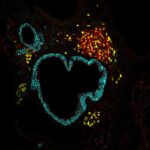
Publication: NCR3/NKp30 contributes to pathogenesis in primary Sjogren’s syndrome.
Publié dans: Science Translational Medicine, 2013, 5 (195), pp.195ra96
Auteurs: Sylvie Rusakiewicz, Gaetane Nocturne, Thierry Lazure, Michaela Semeraro, Caroline Flament, Sophie Caillat-Zucman, D. Sene, Nicolas Delahaye, Eric Vivier, Kariman Chaba, Vichnou Poirier-Colame, Gunnel Nordmark, L. Eloranta, Per Eriksson, Elke Theander, Helena Forsblad-d'Elia, Roald Omdal, Marie Wahren-Herlenius, Roland Jonsson, L. Ronnblom, Joanne Nititham, Kimberly E Taylor, Christopher J Lessard, L. Sivils, Jacques-Eric Gottenberg, Lindsey A Criswell, Corinne Miceli-Richard, Laurence Zitvogel, Xavier Mariette, Damien Sène, Maija-Leena Eloranta, Lars Rönnblom, Kathy L Moser Sivils, Alain Saraux
Résumé
Primary Sjögren’s syndrome (pSS) is a chronic autoimmune disease characterized by a lymphocytic exocrinopathy. However, patients often have evidence of systemic autoimmunity, and they are at markedly increased risk for the development of non- Hodgkin’s lymphoma. Similar to other autoimmune disorders, a strong interferon (IFN) signature is present among subsets of pSS patients, although the precise etiology remains uncertain. NCR3/NKp30 is a natural killer (NK)-specific activating receptor regulating the cross talk between NK and dendritic cells and type II IFN secretion. We performed a case-control study of genetic polymorphisms of the NCR3/NKp30 gene and found that rs11575837 (G>A) residing in the promoter was associated with reduced gene transcription and function as well as protection to pSS. We also demonstrated that circulating levels of NCR3/NKp30 were significantly increased among pSS patients compared with controls and correlated with higher NCR3/NKp30 but not CD16-dependent IFN-γ secretion by NK cells. Excess accumulation of NK cells in minor salivary glands correlated with the severity of the exocrinopathy. B7H6, the ligand of NKp30, was expressed by salivary epithelial cells. These findings suggest that NK cells may promote an NKp30-dependent inflammatory state in salivary glands and that blockade of the B7H6/NKp30 axis could be clinically relevant in pSS.
Lien vers HAL – univ-brest-01558189

